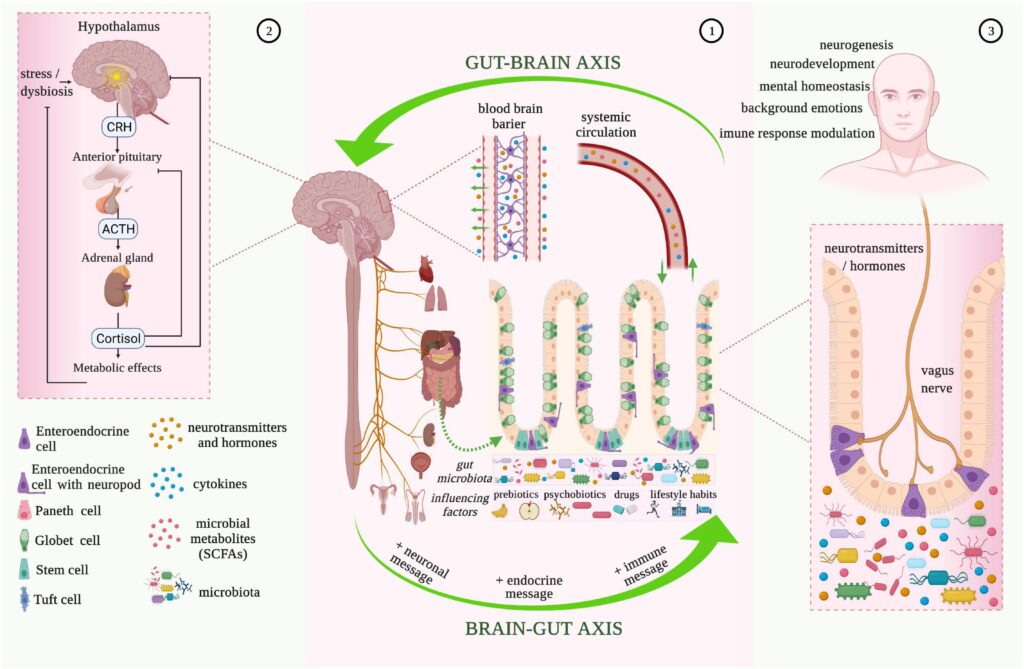At Thrive Wellness, we recognise that mental health is multifaceted, and addressing it from all angles is important. While psychological therapy plays a significant role in mental health care, did you know that your gut health could be just as important? The gut-brain connection influences everything from mood to cognitive function and improving the health of your gut could be your ticket to a happier mind.
The Gut-Brain Connection: More Than Just a Feeling
Your gut and brain are constantly communicating through what’s known as the gut-brain axis – a two-way street where your gut can influence your mood, thoughts, and overall mental health, and vice versa. Here’s how it works:
Neurotransmitter Production: Did you know that a significant amount of serotonin, the “happy hormone,” is produced in your gut? A healthy gut is essential for maintaining optimal serotonin levels. An unhealthy gut can disrupt serotonin production, leading to mood swings, anxiety, or even depression.
Inflammation and Immunity: A disrupted gut can lead to systemic inflammation which has been linked to mental health conditions such as depression and anxiety. A healthy gut helps maintain a balanced immune response, reducing inflammation and potentially alleviating symptoms.
Nutrient Absorption: Your gut is responsible for absorbing the nutrients that your brain needs to function effectively. If your gut isn’t healthy, you might miss out on essential vitamins and minerals important for mental clarity, emotional balance, and resilience.
Microbiome Balance: Your gut is home to trillions of microorganisms, collectively known as the microbiome. These beneficial bacteria help regulate mood by producing and modulating neurotransmitters like serotonin and GABA. They also help maintain the gut barrier, enhance nutrient absorption, and regulate immune responses. When the microbiome is imbalanced – a condition known as dysbiosis – harmful metabolites and endotoxins are produced, leading to inflammation and poor mental health.
Why Psychological Therapy Alone May Not Be Enough
Psychological therapy is an essential part of mental health care, but it’s not the only piece of the puzzle. While therapy can help you manage emotions, thoughts, and behaviors, it may not address the underlying physical issues that could be contributing to your mental health struggles.
This is where a Certified Practicing Nutritionist (CPN), also known as a Clinical Nutritionist, can help. Through comprehensive assessment of your medical history, current symptoms, lifestyle factors and laboratory testing, a CPN can create a personalised plan that includes dietary modifications and therapeutic supplmenentation to support and enhance your mental well-being.
Research shows that this evidence-based, dual intervention approach of tackling mental health from both the inside and out produces better outcomes than psychological therapy alone.

How Clinical Nutritionists assess and improve your Gut-Brain connection
Certified Practicing Nutritionists (CPNs) are tertiary qualified, clinically trained, Practicing Nutritionists who assess and address a person’s nutritional biochemistry and metabolism by providing customised recommendations within a clinical and nutritional medicine framework to improve health. Using dietary and lifestyle modifications along with therapeutic supplements, CPN’s aim to remediate the metabolic dysfunctions that drive a person’s poor health and/or chronic disease states. Here’s what you can expect when working with a CPN at Thrive Wellness to improve your gut-brain health:
- Comprehensive Assessment: Upon scheduling your appointment, you’ll receive an information pack and questionairres for you to complete detailing your health concerns, symptoms, lifestyle, dietary habits, and your health goals. Your CPN will review this information prior to your initial consultation, identifying key areas and questions to explore further during your first meeting.
- Additional Assessments: Your CPN may suggest further investigations, such as additional questionnaires, food diaries, or laboratory tests (e.g. blood, saliva, stool). A comprehensive stool analysis, for example, can profile your gut microbiome’s diversity and abundance, shed light on the health of your gut lining and mucous, nutrient breakdown and absorption and measure inflammation.
- Customised Recommendations: After evaluating your information, your CPN will provide tailored recommendations, education and support to help you implement the recommendations. Restoring gut health following dysbiosis typically involves five to six consultations over a 6 month timeframe, sometimes longer. Initial recommendations are based on population-based scientific studies, wheras prescription following specialised testing allows for a higher level of personalised health care due to your specific biochemistry and needs being identified. As not everyone requires advanced testing to get results, a cost-effective option can be to engage in an initial 2-3 month course of therapy and only pursue additional testing if you’re not getting the results you want.
- Nutritional Medicine – Supplement and Dietary recommendations: Your CPN will prescribe evidence-based therapeutic supplements and dietary modifications to address underlying issues. For example, if you’re lacking in key nutrients like magnesium, B-vitamins, or Omega-3 fatty acids, supplements might be recommended to fill the gaps, enhancing your mental health outcomes. Select clinical probiotic strains and prebiotic fibres will be prescribed to modify gut microbiome composition. Although making permanent changes to gut microbiome diversity and abundance takes a long time and requires a diet diverse in plant-foods to sustain it (possible without ongoing supplementation), faster improvements in mental health from taking psychobiotics occur on average, within 6 weeks. Such outcomes are due to the metabolites that the psychobiotic strains produce having a modulatory affect on the micorbiome-gut-brain axis and immune system, leading to significant reduction in depression and anxiety. Of course, gut health is just one system that may be contributing to and impacted by your mental health, as others systems are also affected, your CPN will provide you with recommendations that address your whole body and bring it back into balance. For this reason, early improvements in energy, mood or sleep may occur in just a few days.
- Transition to self management – Once balance is restored and your mental health wellness goals achieved, your CPN will provide you with a plan for maintaining your health, along with education on how diet and lifestyle alone can acheive this without the need for ongoing supplementation. Clients with a long history of being unwell, may cling to supplementation out of fear they might become unwell again. The supplements used for restoring homeostasis however are often not needed ongoing, with the exception of specific circumstances. An example of an exception is an individual experiencing ongoing stress, who has a genetic SNP or other variant that increases their susceptibility to poor gut, immune or mental health. Another example is an individual who is unable to make the necessary diet and lifestyle modifications to maintain their health. Your CPN will discuss your individual needs with you, and customise ongoing supports for you accordingly.
Ready to improve your Mental Health?
At Thrive Wellness we’re passionate about providing multidisciplinary, evidence-based, comprehensive, holistic mental health care. We value psychological therapy as an important primary mental health intervention. Our psychologists help you manage emotions, thoughts, and behaviors, and provide you with evidence-based strategies to reduce stress, however they can’t address underlying biochemical, genetic or metabolic issues that could be contributing to your mental health struggles. If you’d like to support your body using clinical nutrition and nutritional medicine interventions, reach out and request a CPN consultation. After all, when it comes to your well-being, why settle for anything less than complete care?

Image by pikisuperstar on Freepik
About the author:
Felicia McQueen is a Certified Practicing Nutritionist (CPN) and Accredited Exercise Physiologist (AEP) at Thrive Wellness. With qualifications in nutrition, exercise science, and neuroscience, she supports mental health through personalised, evidence-based care. Felicia works as part of a collaborative interdisciplinary team alongside clinical psychologists to deliver integrated support.

Leave a Reply